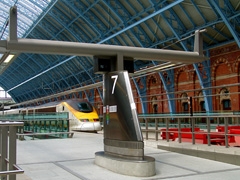
Newly opened St. Pancras terminal for the Eurostar. Nicest way to travel between the London and Paris. The terminal opened in 2007.
Sorry for the delay, but here, at long last, is my Wimbledon resume.
.
OFF TO LONDON TO WATCH FEDERER TRYING TO BREAK RECORDS…HOWEVER
Roger Federer is worried.
That is the diagnosis of the eminent Belgrade psychologist, who also plays some tennis, Novak Djokovic. Considering his most recent egg laid in a significant nest, the French Open final – scrambled, poached or sunny-side-down – Federer has a right to nibble his nails down to the shoulderblades.
Djokovic, who pick-pocketed Federer’s Australian Open title five months ago, suggests that the pressures of being perfect for so long have eroded the efficiency of the Lord of the Swings, and that it’s time for a changing of the guard – not outside of Buckingham Palace but at Roger’s palace, Wimbledon’s Centre Court.
Queen, Elizabeth II doesn’t care for tennis, even though – or maybe because — her father, George VI, played the Big W in 1926. He, then the Duke of York, a lefty such as champs Martina Navratilova, Rod Laver, John McEnroe, however performed like a serf in doubles, and returned only as a spectator. The Queen, like Federer, a believer in long reigns, may not feel that five years is enough for the gifted Swiss. Dissenting feelings come from Serbia and Spain in the persons of outspoken Djokovic and outpopping muscular Rafa Nadal, who fried Federer, 6-1, 6-3, 6-0, in Paris – a bagel with your egg, Roger?

Despite a “The sky is not falling!” theme, Federer is definitely off his A-plus game. His winning of only two titles this year, inconsequential affairs, and losses to lesser types Mardy Fish, Radek Stepanek, Andy Murray (a 37-8 record) have fueled talk of decline.
But…but…but this is Wimbledon. This is where each grassblade seems to bow to him, Centre Court an Elysian Field welcoming him back with a streak of 34 match wins intact and the ghost of Willie Renshaw trembling. This is the stage on which Roger is expected to open – and close – the show. The Slovak Dominic Hrbaty had a chance for an historic niche by beating Roger at the start. Not much of a chance. It has happened once before: 2003, a lean year, a nobody whacking No. 1, the defending champ. That was the Leaning Tower of Zagreb, 6 foot-10 Ivo Karlovic, a qualifier ranked No. 203, taking out Lleyton Hewitt. But Hewitt was no Federer.
One of Federer’s foes now is the history book. On winning, the U.S. Open last year, his 12th major singles, Roger was two behind Pete Sampras’s record. Everybody, including Sampras, conceded that it would fall soon. Maybe, but will life be easier for Roger, 27 in August, with Djokovic, 21, and Nadal, 22, snapping at his sneakers.
Then, there’s 147-year-old Willie Renshaw out there somewhere in the ozone. Willie holds the record of six successive singles
crowns (1881 – 86) that Roger seeks to equal and surpass. But it was somewhat less demanding physically in the days of Willie, a native who is credited with popularizing Wimbledon, along with his twin brother, Ernest. (They won the doubles seven times.) The singles champ needed to play only one match the following year, a challenge round against the winner of the all-comers tourney. Thus over six straight years Willie won merely 12 matches. That system lasted until 1920.
Bjorn Borg also had Willie on his mind in 1981. Finally beaten after five consecutive titles and a record 41 straight matches by John McEnroe, Bjorn feels that Federer will come through, and will be pleased to watch him do it. “That’s what the records are there for – to be broken,” he says. “I enjoyed it when I broke them.” One of his that probably won’t be: 33 straight Davis Cup singles wins.
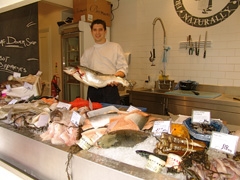
But Bjorn recognizes that Federer has the tougher draw: Djokovic in the semis, and Nadal, who pushed him to five sets in the brilliant 2007 finale. That’s if all goes to expectations for the Terrible Triangle, standing out away from the rest.
My choice is the constantly improving Nadal. He’s not your usual Spaniard, believing that grass is meant for football, cows’ salad greens and Goya’s landscapes. He liked it immediately, though a mystery. But his speed, athleticism and competitive verve lifted him to two finals on his third and fourth expeditions.
“Maybe I serve-and-volley someday, no?” Rafa laughs, as good naturedly as the lone Spaniard to go all the way, the engaging Manolo Santana in 1966. Santana also won the U.S. Championship in 1965, pre-Flushing Meadow, spread across the Forest Hills lawns in New York.
Djokovic, in launching psychological warfare, talking about Federer’s worries,
has a few problems there himself. But the pressures also may be spread three ways across the hall in the dolls’ boudoir, where No. 1, abandoned by Justine Henin, is currently held by French Open champ Ana Ivanovic — and is there for the plucking. The other Serbian, Jelly Jankovic, is No. 2; the 2004 champ and present Australian title-holder Russian Maria Sharapova No. 3.
And the envelope? My pick is No. 7 Venus, to hang onto her championship. Big Sister Williams is the most relaxed gal in the ball park, and – can you believe it? – this is her 11th start and she’s pursuing her fifth title.

So the grand-daddy of all tennis tournaments cranked up again, time to order green — creme de menthe on ice cream — and dream of the Lord of the Swings virtuosity. Even if he is worried.
EVEN A FAVORITE HAS TO HAVE LUCK
The yellow ball smacked the white tape running the length of the net. Amid the gasps of 10,000 witnesses, Ana Ivanovic felt that her last shot of a ragged afternoon had failed, and, for her, Wimbledon 2008 was over.
It wasn’t supposed to be this way, not in the second round. After all 20-year-old Ana had just won the French Open, elevating herself to planetary No. 1. Her foe, lanky Frenchwoman Nathalie Dechy, came in at No. 97, and hadn’t won as many as two matches in a row in a long time. But Dechy, better known as a doubles player, was behaving as though there were two of her on the lawn of Court 1.
She had worked herself to a 7-6 (7-4), 5-4 lead as Ana served at 4-5, 15-40 – two match points.
Although Ivanovic dodged one with a forehand winner, next came the forehand that seemingly flunked. Her jaw sagged and her green eyes appeared ready to overflow as the ball struck the net cord, and ascended, ready to plop on her side of the net.
“It was in the air for a while – I didn’t know which way it would bounce,” Ana recalled. “Time stopped. I was shocked for a few minutes. Lucky. I was so lucky…”

As the clock stopped for both of them, we could see that, even though perfectly round, a tennis ball can do weird things. Once it banged the tape, the fuzzy spheroid rose perhaps a foot, touched the cord on descending, and commenced a bizarre dance. It shimmied, lurched, trickled one way, then the next like a drunken tight-rope walker.
Dechy had to wait, too. “I thought I won,” said she, who had been down 3-0 in the first set and felt she was out of it quickly. “But the ball didn’t fall my way. That’s sport. Maybe someone in the sky was helping her.”
Ana’s take was, “Someone from upstairs wanted me to win. Destiny.” She liked to think that destiny would stick around for five more matches.
At last gravity took over as the ball slid down the netting and settled on the grass. Dechy had no play. Nathalie was the eventual loser of a rock-and-roar decision over 3 hours-24 minutes, 7-6 (7-2), 6-7 (3-7), 10-8, during which the gallant 29-year-old ducked two match points and almost hoodwinked destiny.
While Ana was one stroke from obliteration, the Serbian Surge was in big trouble on another front, Centre Court. She escaped but Novak Djokovic didn’t, and those in the Roger Federer camp rejoiced. Really, it was a day for general hallelujahing among the 40,653 who crowded the Big W – not a jigger of rain, only sunshine. For a third successive day yet. That doesn’t happen often at this celebrated tropical rain forest of Southwest London.
And who should do his bit in a purge of the Surge but none other than the all but
forgotten Headless Horseman, Marat Safin?
What does Marat’s immaculate 6-4, 7-6 (7-3), 6-2, triumph over No. 3 Djokovic do for the lately down rated Federer, who’s shooting for his sixth consecutive crown? It was quite possibly a life preserver. Until yesterday, it looked as if Federer would have to beat Djokovic (semis) and Rafa Nadal to keep his shiny crown – probably too tall an order. But now Djokovic is gone, and maybe Safin eventually became the semifinal exam. The last time Marat and Roger clashed in a major semi, the quixotic Russian won and continued to the 2005 Australian title.
Since then, however, Marat has been upstaged by his 6-foot little sister, Dinara Safina, finalist in the recent French to Ivanisovic. She ranks No. 9, he No. 75.
Maybe, as I hope, he’s making a genuine comeback – “I’m working harder than ever” – and can reproduce the Safin of 2000 who blew away Pete Sampras to win the U.S. Open.

Djokovic kept waiting for Mafin to make mistakes, but they didn’t materialize. Meanwhile his own did – “uncharacteristic errors, unusual double faults (10).” His thesis is that Federer is feeling the heat from himself and Nadal, but he had to admit that it’s gotten to him, too.
Safin said, “I took advantage of his feeling the pressure. When I got little openings, I went for them. Novak didn’t.”
One big victory doesn’t a title make, cautioned Safin, never better than a quarter-finalist here (2001). “I don’t even know who I play next. It’s been a long time ago. I don’t remember when I won two matches in a row.” [Italian Andreas Seppi, No. 30, followed.] “If you play a guy, Djokovic, in the second round who won the Australian Open and was semifinalist at the French, what do you expect? You’re not in position to think about the third round.”
But he was. His glorious groundies along the lines were paying off, and he, the pavement-lover, even had kind words for the grass: “Thanks for the (Wimbledon) people to make the courts slower. You can play from the baseline, nobody even getting close to the net.”
Wimbledon authorities deny any change. Marat and others believe they may have found some grass seed labeled Slo-grass. Whatever, he gave folks in Belgrade a hard afternoon of watching. Nathalie Dechy nearly made it a tragedy for Serbia until Ivanovic lucked out with that net-cord dribbler.
When that was over Ana smooched the cooperative cord. “I don’t blame her,” said Dechy. That net deserved her kiss. She should immediately play the lottery.”
GRAVEYARD 2, ALAS, FACES OWN BURIAL
An obit for the obit-maker.
After a long and unhappiness-clad life that inspired countless maudlin headlines and funeral notices, the renowned Wimbledon graveyard – Court 2 — is about to be shoveled under itself.
Sing no dirges for the obituary maker. The grassy plot just across the main concourse from Centre Court has had its crepe-edged days of making life miserable for marquee names — and ecstatic-for-a-day for such as a Swiss named George Bastl. That was in 2002 when Bastl, ranked No. 145, crafted Pete Sampras’s farewell to Wimbledon in the second round.

“That’s not how I wanted to end my Wimbledon career — on Court 2,” scowled Sampras, who looked peeved enough to kick a couple dozen buckets. As the record seven-time champ, Pete justifiably expected better treatment from the scheduling committee – but that’s the way the tomb loomed.
Not that Court 2 is a different size from any other, or that – as some upset victims claimed – the playing field wasn’t level. But the intimacy made the 2192 seat arena a choice perch for patrons, who seemed close enough to whisper in players’ ears.
However, 2 is being deep-6′d. A new 2 will be unveiled next year, a tidy stadium with no tradition or curses within its walls, at least for a while. So yesterday was the last chance for burial of a notable as the tourney narrowed to quarter-finals, to be played out on Centre or Court 1.
But the Sisters Sledgehammer, pointed toward their first Williams-only title bout here since 2003, were having no hearses or reverses.
Although both of them have been been RIP’d at the hands of lessers on Court 2, Serena by Rhode Islander Jill Craybas, No. 85, two years ago, they avoided self-mourning effortlessly: champ Venus over sturdy 18-year-old Russian Alisa Kleybanova, 6-3, 6-4; Serena over compatriot Bethany Mattek, 6-3, 6-3.
Court 2 began developing a fatal reputation in the late 1960s, and got a significant necrological lift in 1973 when overwhelming title favorite Ilie Nastase, the Bucharest Buffoon, was knocked off in the fourth round by an American college kid, Alex Mayer out of Stanford.
Thereafter it wasn’t unusual for highly seeded Wimbledon champions to be waylaid there by inferiors, among them: Andre Agassi by No. 281 Doug Flach in 1996; Jimmy Connors by Kevin Curren in 1983, and Patrik Kuhnen in 1988; Arthur Ashe by Chris Kachel in 1979; Conchita Martinez by No. 194 Samantha Smith in 1998, and by No. 79 Sonya Jeyaselan in 2000; Michael Stich by qualifier Bryan Shelton in 1994; Richard Krajicek by No. 196 Enzo Manta in 1999. You could count on it, and scouted the daily schedule to see which bigshots looked vulnerable on 2.
But that era is over. Tennis in a closet, as Court 2 skirmishes often seemed, becomes the victim of so-called progress as management attempts to modernize the 86-year-old playpen. But the new 2 will never be as much fun.
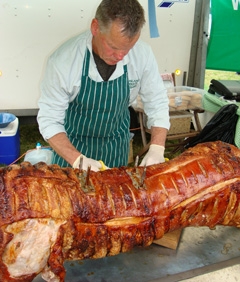
Maybe it’s because we used to get at least one good, unlikely-upset a year from the old funeral parlor that endeared it to us newspaper guys.
But if 2 couldn’t push the Sisters close to embalming, there were fireworks aplenty elsewhere, especially among the dolls where the 31-year-old Thai, Tamarin Tanasugarn, and the hardly recognizable Chinese, Jie Zheng, gave the place a spicy oriental feel with victories over favorites.
Falling to her knees in happy tears – “In 12 years here I never made the quarter-finals” — Tanasugarn finished off the Serbian Surge in the person of Jelly Jankovic, 6-3, 6-2. Jankovic came in as No. 2, Ana Ivanovic No. 1 and Novak Djokovic No. 3 – but they’re all gone. In fact so are the top four females (Maria Sharapova was No. 3), the first time ever at this stage. No. 4, Russian,
Svetlana Kuznetsova, got bounced by the petite Pole, Aggie Radwanska, 6-4, 1-6, 7-5.
Because she’d written a polite begging note to management (and had won the doubles with Yan Zi two years ago), No. 133 Jie Zheng was rewarded with a wild card. She more than earned it Saturday by eliminating Ivanovic, and followed up, 6-3, 6-4, over No. 15 Hungarian blonde Agnes Szavay.
The last time anybody looked, the men’s top two – Roger Federer and Rafa Nadal – were intact. In a rematch of champions defender Federer continued punishing 2002 ruler Lleyton Hewitt, this a 12th straight time, 7-6 (9-7), 6-2, 6-4.
But Marat “I hate grass!” Safin, having
sunk to No. 75, continued his revival on the green, marching to the quarters where he once landed seven years ago, this time 6-4, 6-3, 5-7, 6-1, over No. 9 Stash Wawrinka, Switzerland’s other Top Ten guy.
While daytime belonged to the ladies, nightfall became the property of an actual British tennis player: Andy Murray. Starting timidly, 21 year old Andy looked like a prime candidate for interment at Court 2. Two sets down, two points from defeat, visibility fading, the swift, the skinny Scotsman somehow came on undeniably.

Screaming like a werewolf, Murray pulled the full house of 15,214 in Centre Court with him as well as millions across the British Isles, as he defied darkness, the sometime brilliant shotmaking of Frenchman Richard Gasquet and a long history of British flops – and won 5-7, 3-6, 7-6 (7-3), 6-2, 6-4.
Lasting 3 hours 58 minutes, ending at 9:31 PM, it was one of the latest finishes in the tourney’s history.
“I’m ecstatic!” cooed Sue Mott, author of Andy’s bio, “Hitting Back!” “This should sell a few books.” Then, she couldn’t resist saying to this American reporter, “And how many Yanks, other than Venus and Serena, are left in the tournament.”
OK, sister, you win, this time. You long-suffering Brits deserve a few chortles.
BIG NATION, LITTLE LADY: CHINA’S HERE
Take your pick. The Wimbledon story today is either a guy with a pronounceable name, Andy Murray, or a China doll with an unpronounceable name, Zheng Jie.
When the 21-year-old Scotsman Murray, out of Dunblane, awoke yesterday morning, he knew how the Duke of Wellington felt the day after he beat Napoleon at Waterloo.
London was his, at least the front and back pages – and many in between – of the numerous dailies, as well as loads of TV and radio minutes because he, too, had beaten a Frenchman, Richard Gasquet, improbably, in a tennis tournament.
In a town where the prime minister is under fire, the pound feels like a ton (at least to Americans with their puny dollars), the sun makes people nervous by shining on and on, Murray was just the good news that everybody needed. He was regarded as a grouchy, unpatriotic, overpaid kid when he walked onto Centre Court Monday evening. About four hours later, in darkness, and with Great Britain at his feet, he had removed the Frenchman, 5-7, 3-6, 7-6 (7-3), 6-2, 6-4, and his tennis poor Isles had a contender.
British-French enmity goes back a long way and several wars, so one over-enthused journalist compared Murray to King Henry V knocking out the cross-Channel neighbors at Agincourt in 1415. “Shakespeare would have loved Andy,” wrote another.

“This is ecstasy!” wrote yet another.
Forgotten was Andy’s recent dodging of Davis Cup duty (contributing to a defeat by Argentina), and considered so sinful in this territory that he was publicly condemned by teammate (and brother), Jamie Murray.
Never mind. He’s in the quarter-finals against Rafa Nadal, and the countryside is goo-goo with Murray madness. The general feeling is that the Queen should give Andy the knighthood she lifted from the Zimbabwean psychopath, Mugabe. If he should ever capture the Wimbledon crown – last won by a Brit in 1936, Fred Perry – Andy will be richer than the Queen. You can see how frantically a win here or there can stir the Limies. After giving the world Wimbledon, they deserve a champ.
Britain has been through this before, of course, vainly seeking a successor to Fred Perry. Not long ago Tiny Tin Henman became beloved in his quests for the title – but Pete Sampras was always in the way. Murray appears better equipped, swift and (sometimes) very combative. Being three wins away from nirvana gives him hero status. For 24 hours anyway.
From the hero we switch to the unpronounceable heroine: Zheng Jie. Doesn’t look hard, but no umpire or TV babbler has gotten in right yet. A kindly Shanghai reporter, Jade Gu, has stopped by my desk to lecture me. She instructs, “It sounds like this – Jun Tee-ah. With the correct tones. Repeat, please.”
I try. And try. And come close. So who cares? Who? Millions of Chinese, that’s who. And why? Because this slim, pretty, brown-eyed lady of 5-feet-5 has done the previously undone, news that is flashing across that vast land where Chairman Mao himself had a brief tennis career. [It ended sadly when a goat ate the net that he and comrades used during the Long March days in Shensi Province.]
Arriving in London, looking for a handout – a wild card – Jie, ranking No. 133, not only was the beneficiary of management’s charity but progressed to the semifinals over a Czech, No. 18 Nicole Vaidisova. No female Wildie had ever gone past the quarters, but she did, 6-2, 5-7, 6-1, the last of four foes outranking her. The going gets rougher: ex-champ Serena Williams is in Jie’s face.
“It’s a dream,” she says through a translator. “I will try my best against Serena.” As if beating No. 1, Ana Ivanovic in the third round wasn’t enough, she kept her flat strokes low, taking to grass as though it were Sichuan green beans, a favorite where she comes from.
Yes, she’s from way out west, a handsome Sichuan city called Cheng Du, 50 miles from the area struck by the recent deadly earthquakes.
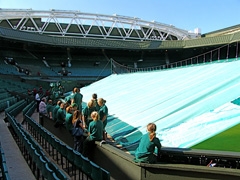
Could she become a wild card champion? Only one has made that journey from panhandling to the palace: Goran Ivanisevic in 2001, ranked 125.
If Murray awakens today feeling like Lord Nelson of Trafalgar, Zheng Jie, feels like Mrs. Li Chen, grateful to her husband/coach for “improving my serve.” She has made them rich. Sort of. “I want to give my prize money (at least $ 370,000) to earthquake relief and to try to raise more money.”
She isn’t sure how much she can give away. Or even how much is hers, since the Chinese Federation operates like the bygone Soviets, keeping most of the prize money for the Federation itself.
We’d better learn to pronounce that name.
FAMILIAR? ANOTHER FAMILY AFFAIR
Yoo-hoo, Mrs. Williams…can Serena and Venus come out and play?
It’s been a while since the two-woman sorority (Phi Beta Slamma) has been unleashed in concert. But here they are again: Venus and Serena, taking over yet another major championship, waving their gut-strung wands and making everybody else disappear.
The occasion is a private lawn party (aka a tennis tournament called Wimbledon), to which they invited 126 other ladies, but eventually told them all to “Get lost – Wimbledon belongs to us!”
Rude, perhaps. But by this time, of course, we know that the Sisters Sledgehammer can do pretty much what they want to do on the patch of grass named Centre Court, the cathedral where they make believers out of whoever shows up. A Russian and a Chinese showed up yesterday, saw seductive carrots dangled in climactic tie-breakers – then swiftly pulled out of reach. Didn’t make much difference to these two old hands at playing major semifinals. Venus took 1 hour 42 minutes to beat the statuesque Muscovite, Elena Dementieva, 6-2, 7-6 (7-3).
Because, in the words of Arnaud Clement, “Wimbledon became Wimbledon again,” – meaning two rainy interruptions after eight sunny days – Serena had to hang around much longer, although, her 6-2, 7-6 (7-5), victory over the people’s choice in the People’s Republic consumed only 1 hour 25 minutes of playing time.
Clement, the jaunty little Frenchman, was the losing part of a sideshow that ran over two days and lasted 5 hours 12 minutes. Despite holding a match point, he was beaten by a missing person, German Rainer Schuettler, 6-3, 5-7, 7-6 (8-6), 6-7 (7-9), 8-6, the second longest match in the Big W’s annals, equaling the 1969 classic in which Pancho Gonzalez rescued 7 match points to beat Charlie Pasarell. The house record is 5 hours 28 minutes, Todd Witsken over Greg Holmes, 5-7, 6-4, 7-6(7-5), 4-6, 14-12, a 1989 second round match played over three days.

Schuettler, No. 6 in 2003, seemed to then fall out of the game. Injuries and illnesses held him back but he has worked his way back to No. 90, and gets a semifinal shot at Rafa Nadal while the champ, Roger Federer, is tested by the rejuvenated No. 75 Marat Safin.
But the Sisters, sidetracked at times by injuries and various distractions, have never been missing persons around here since Venus bagged the first of her four Wimbledon titles in 2000. One or the other has been in the final eight of the last nine years, Serena winning twice. Together they have stashed away 14 major championships, eight for Serena.
Up comes their seventh clash in a major final. Numbers, numbers, numbers, but they can’t come close to the spunky little Chinese Zheng Jie when it comes to TV numbers. More than 100 million have been looking in on her adventures at a place she calls “Wimberdun,” even though they have had to sacrifice a lot of sleep, and probably never gave tennis much of a thought before Jie Whiz Jie appeared.
When her last stroke went plunk into the net for a concluding double fault, it was very early morning in Beijing. But Jie had kept her newfound fans in a state of happy suspense through five victories, one of them over No. 1 Ana Ivanovic, as she became the first of her country to climb so high in a major. Two other triumphs eliminated high seeds – 15th Agnes Szavay and 18th Nicole Vaidisova.
Jie came to town empty-handed, No. 133 in the eyes of Medusa, the Women’s Tennis Association computer, but beneficiary of a wild card for which she has constantly thanked the proprietor, the All England Club. Her ranking will ascend to the 40s. She has received so many congratulatory messages from the People’s Republic that you’d think she was the Obama chairman for China.
A petite 5 foot 5, just turned 25 tomorrow, Zheng was making her singles debut on grass. “I thought I could win when I had the set point in the second [5-6, 30-40, second serve]. But probably I was thinking too much about it” – she bungled her usually reliable backhand return. “I wanted to win for all those people watching. But I’m satisfied. Serena’s serve was too big for me” — 14 aces, 11 service winners. A 123 MPH winner set up the match point.
“I wanted it now. Now, not going into a third set – and I got it,” exclaims Serena. Nevertheless Zie’s flat, double barreled backhand was impressive. You wonder, however, what the Chinese Tennis Federation’s reaction will be if Zie and her teammates don’t do well in the Olympics. Pressure will be considerably higher in Beijing than Wimbledon.

Maybe their winning ways haven’t changed, but life has for the Sisters. Mama Oracene Price is no longer Mrs. Williams. A sister was murdered – “something that affects you more than you know,” says Serena. “The older we get, the closer Venus and I get. As people and players.” Both she and Venus resent that “a lot of people say our matches against each other aren’t very good. But they get better all the time.”
Venus said, “I found it offensive what was said [years ago]. We’re professionals.” She meant that Papa Richard Williams was suspected of dictating which would win. It was a nasty charge in my view. They were raised to be champions, not actors.
Of their 15 head-to-heads – Serena leading 8-7 – only one has been sensational: Little Sister’s 2003 Australian Open final victory, 7-6 (7-4), 3-6, 6-4. They’ve likely played a million times. Starting as kids. “We’re good at this now. We just leave everything out on the court. This is the final of Wimbledon. Who doesn’t want it?
“I’m definitely surprised that we
haven’t played a final here in five years.” She won then, 4-6, 6-4, 6-2.
Venus, who trailed in her tie-breaker, then ran the last five points past Dementieva, says, “I can’t imagine having a pro career without Serena. She inspires me. She taught me how to dig deeper, be a fighter. But it’s every Williams for themselves once we get to the final. We want the best for each other – except in the final. We have very good genetic. I think it’s all in the genes. My mom and dad were good athletes. I think it’s a blessing in the genes.”
Rooming together, they are very different. “I read a book, Serena watches videos,” says Big Sister.
Serena has made this threat: “I might get up early Saturday and eat all the breakfast food. All the Wheaties.” Well it will be the breakfast of champions for one of them, and Mom says they can come out and play,
PLAY IT AGAIN, GUYS – ROG AND RAFA
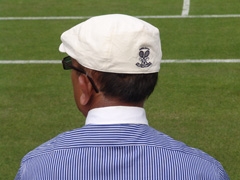
Marat Safin may have lost his touch. He smashed and crumpled only one tennis racket during his semifinal audition with Roger Federer on Centre Court. His fans were disappointed. They expect more fireworks from the appealing Russian of strong temper and physique, but the American Fourth of July custom means nothing to him.
He also lost the match, 6-3, 7-6 (7-3), 6-4, but Marat didn’t need to destroy equipment to express himself. Body language was sufficient, translatable into any tongue. Upraised hands…weary shakes of the head… eyes rolling, scanning the heavens…shrugs…muffled screams. All of them adding up to anguish, frustration, despair.
That’s what Roger Federer injects into antagonists. Despair as deep as any ocean. None has taken a set from him this time around Wimbledon. Eighteen sets played, 18 won. Sixty-five guys have ventured onto grass courts against him since 2002, and 65 have not escaped his paralyzing shots. The last to beat Roger here was the tall Croat, Mario Ancic, in the opening round six years ago.
When Federer and Rafa Nadal collide to determine the identity of the best player on the planet, the great god Borg will be seated in the Royal Box, looking over their shoulders.
Bjorn Borg, the Swede whose golden locks have silvered, is as curious as everybody else as Federer assaults his Wimbledon records: five consecutive titles and 41 match wins in a row.
“For sure he caught me with his fifth last year,” says Borg, 52, whose reign, 1976 – 80, was razed by John McEnroe in the 1981 final. “I was happy for him. Records are to break. Now will he get a sixth? I wish him well.” Nevertheless, Borg has picked Nadal to win.
It’s about here that the descendants of Willie Renshaw should be heard from. After all, Willie won six successive titles (1881-86), and seven altogether, though he wasn’t called on to play as many matches in those bygone days. And it shouldn’t be forgotten that Pete Sampras ruled the Big W seven times between 1993 and 2000, or Martina Navratilova nine times for that matter, between 1978 and 1990.
But not since the Borg-McEnroe masterpieces of 1980 and 1981 has a final been awaited with such rapt anticipation. It’s the heavyweight championship of tennis, no doubt about that. I would say the same for the female title bout – Venus and Serena – regardless of what Medusa, the WTA computer, has in its electronic mind, ranking them Nos. 7 and 6 respectively.
Nadal is 18-1 in sets here, losing a second round set to the impressive Latvian Ernests Gulbis, and is riding a 23 match winning streak, dating back to the Italian Open where blistered feet contributed to his early loss to Juan Carlos Ferrero. After a monstrous spanking of the new British hope, Andy Murray, in the quarters, he delivered a sub-standard semifinal performance in beating No. 90, German Rainer Scheuttler, 6-1, 7-6 (7-3), 6-4.
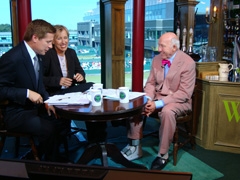
Rafa keeps insisting that “Federer is No. 1. He can do everything better on a court than anybody. Even if I win the title, he will be No. 1 and I No. 2.
Federer says that his horrific defeat (6-1, 6-3, 6-0) by Nadal in the French final “is hardly remembered. It went so fast. It’s important for me to bounce back, and that was clay. This is grass” (Centre Court his backyard.) “I haven’t had any problems throughout the Championships. Pretty simple, so far, quite unbelievable actually. This is my favorite part of the season – Wimbledon, the Olympics and the U.S. Open.
“After last year people expect a lot of us, especially since Rafa has improved on all surfaces. But you don’t always live up to expectations.”
It was in that nerve tingling 2007 final where Rafa found out he could really handle grass. Five sets they battled – 7-6 (9-7), 4-6, 7-6 (7-3), 2-6, 6-2 – as Federer ducked four break points in the fifth that could have cost him the title.
Schleutter, who may have salvaged a career, beset by sickness (mononucleosis like Federer) and injuries, sums up the final pretty well: “They’re both great champions. It’s amazing how easy Roger makes it always look. I practiced with him here, and he just seems that he’s not even trying.
“Rafa is the opposite. He’s like so pumped and always there.”
Magnificent contrast, that makes the fight. The Spanish tidal wave of topspin against the precise Swiss always on time.
Safin’s usual tirades against Wimbledon and the sod underfoot were absent, his unprecedented semifinal finish as No. 75 reviving his tennis life as well.
He says, “They’ve slowed down the grass which gives advantage to Nadal. Federer will have to play his best to win. But when Roger starts pushing you around with his forehand, or saving break points with first serves on the lines, you can’t do nothing about it.”
Maybe just bust up a few rackets. I’m keeping my picks intact: Venus and Rafa.
VENUS WINS ONE AND IS THE ONE
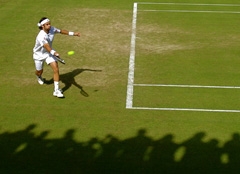
If you’re going to go through a year and win only one tournament – it might as well be Wimbledon. Apparently that’s the way Venus feels. Good judgement.
Since a fifth Wimbledon can get you higher than a fifth of bourbon or any other potable you might name, many among the 15,214 communicants at Centre Court expected her to go into orbit because Venus has said, “I like to jump high when I win. Sometimes I can’t stop.” She has been a human pogo-stick on a couple of victorious occasions at the Big W. But this was different. The victim was also named Williams.
Venus is a woman of taste, and there would be no celebrating the downfall of the betting favorite, Little Sister Serena. Although Serena lost merely two sets in this two-week melee – the world heavyweight championship of tennis in this view – those two were too close to home in Venus’s brilliant 7-5, 6-4, triumph. Venus has been on the low side of the score here, losing two Wimbledon finals to Serena, 2002 and 2003. She knows how it hurts, especially since Big Sister was raised to look out for Little Sister.
If looking after Serena meant firing serves of up to 129 MPH at her, along with thundering two-fisted backhands, and grabbing most of the vital points, then Venus did a helluva job of baby-sitting. Would you hire her to mind your kid?
Imagine, if you can, what it must be like letting the world in on your sibling rivalry. They share an apartment, have breakfast together (Serena didn’t scoop all the Wheaties as she’d playfully threatened), trade a few pleasantries – then make off to Wimbledon to try to knock each other’s block off.
“We’re professionals,” Venus said. “We can handle it.” Most of the time their showdowns haven’t been very absorbing. This one may have been the best. Aggressively they went at each other like a two-woman murderer’s row, throwing caution to the winds, slugging incessantly, retrieving incredibly. And there was a lot of wind gusting about the venerable ball park, causing Venus trouble with her serving toss which she frequently caught, then re-started the motion.
But there was some sun on the chilly 62 degree afternoon, passing as summer in London.
Venus came to town with a meager 14-7 record in only eight tournaments, losing one final to – you guessed it – Serena at Bangalore, India. [Why would anyone of their stature venture to Bangalore in March to play tennis? Heavy cash in appearance fees, of course, but that’s another story. Venus had to settle for $ 1,178,175 yesterday; it’s safe to say the title means more.]
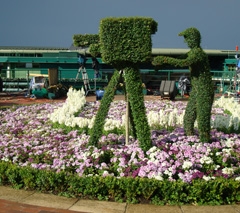
“It’s stratospheric,” she grinned when somebody wondered if she had her eye on Martina Navratilova’s Wimbledon record of nine titles. “Well, Martina played a couple of decades…but it would be nice.” Martina was 25 at her fifth; Venus turned 28 June 17.
This was Venus’s 12th Wimbledon, so five first prizes ain’t bad. She’s three ahead of Serena here, and finally caught up with Little Sister at 8-8 overall in intramural meetings. Serena had won seven of their last nine.
At Venus’s professional debut in 1994, Papa Richard Williams modestly asserted that she’d soon be No. 1, “But I’ve got one at home who’ll be even better.” His record as a prophet ain’t bad either. However, maybe Venus, with her seven majors is turning it around again, menacing Serena’s eight.
Whatever, Venus, losing 10 of the first 11 points and the first two games, quickly made it evident that she wasn’t going to relinquish her championship, to a family member or anyone else. She meant to add it to her 2000, 2001, 2005, 2006 conquests and did because her long legs were making Serena hit too many balls, and Little Sister seemed wearied after an hour and 51 minutes.
“Venus lifted her game and mine went down,” she said morosely. “No it’s not easier to lose to your sister. I lost my rhythm.”
Her forehand was damaging, but she was caught flat-footed often on that side in the later stages.
Eventually, though, Venus coaxed smiles and laughter from Little Sister by accompanying her to the doubles title, 6-2, 6-2, over the Aussie-American combine of Samantha Stosur and Lisa Raymond. The fact that they took home a combined $2,377,536 between them didn’t hurt.
Nothing personal, but Venus was trying to dust off Little Sister, jamming her with serves in tight, resulting in four aces and 10 service winners.
“Yeah, those body serves were my best,” she said. “You have to try to do that against Serena. The 129 MPH winner tied her own women’s speed record. She made her break points count, scoring on four of seven while Serena was two for 13. Standing inside the baseline to receive, Venus was getting the jump on returns
Venus’s ripping backhand return regained the break to 4-4, and she held off four deuces and two breakers to 5-4. Serena got to 5-5 with three of her 10 aces, but faded in the next two games. Despite losing the most exciting game (15 minutes, seven deuces, seven break points) to 1-2, undaunted Venus cracked Serena’s serve immediately, and hurried on her way as Little Sister sagged.
A last ace wiped a match point, but Serena missed a backhand by 2 feet on the next, and her bid for a fourth title in 2008 ended.
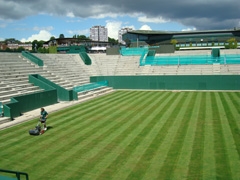
As customary, a military band, the Honorable Artillery Co., preceded the finalists on Centre Court. One number, “We Are The Champions,” fit them both.
RAFA – SPLENDOR ON THE GRASS
A kingdom was at stake, and Roger I must have felt like Shakespeare’s Richard III with darkness and the world closing in on him. King Richard was bemoaning his lack of a horse. King Roger may have been thinking desperately: “A forehand, a forehand – my kingdom for a forehand,” as the concluding shot of his lengthy reign plunked into the net.
A majestic encounter, maybe the greatest to grace the grassy stage of 86-year-old Centre Court – the foremost of the 41 I’ve covered — had to end somewhere or spill into the next day, undecided, because light had just about run out at 9:15. Roger I of the House of Federer, whose forehand is one of the mightiest in tennis history, lined up a routine shot off the backhand of the usurper, Rafa I of the House of Nadal.
“I was thinking first should I go up the line, then I chose crosscourt – and I missed it,” Roger said glumly, his crown on the way to Spain, 6-4, 6-4, 6-7 (5-7), 6-7 (8-10), 9-7. That’s what Nadal does to you – makes you hit one more shot than you wanted to. “Maybe I shouldn’t have missed it. Maybe I wouldn’t on another occasion. Who knows?”
All anybody knew, among the 15,214 congregants on hand, and millions across the planet Roger had ruled, was that amid 4 hours-48 minutes of glorious shotmaking it was settled on an insignificant looking forehand mistake. An abrupt, unexpected finish.
They also knew that a world was changing hands, and that a busted reign would not become a dynasty. That was Federer’s hope, to continue as ruler of Wimbledon with a sixth straight championship, to command indefinitely as Bjorn I of the Swedish House of Borg had sought to do in 1981, until deposed by John McEnroe.
Constantly they flew about the court, Roger so smooth and effortless, Rafa muscling and wailing, each going for the jugular with every shot imaginable. Time after time they stole winning shots from each other to keep the rallies going amazingly, the angles out of a geometry text. Their theme was anything you can hit I can hit better. Federer tried to free himself for those blistering inside-out forehands, and did it often, but Nadal succeeded in concentrating on his foe’s backhand. His wizardry with wildly bounding spin is unprecedented, every weapon in his arsenal upgraded since their 2006-2007 finals.
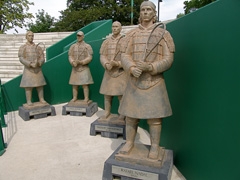
Clinging to one another like leeches, Federer and the puissant lefty, 22-year-old Nadal, traveled the longest of Wimbledon finals over so many bumps that the audience was limp with suspense. Shakespeare would have relished the three act drama in a theatre much like his own Globe. Buffeted by rain, gusting winds and chilliness, it could have been entitled “King Roger Dislodged.”
Act I concluded in a downpour with Federer ahead 5-4, but having lost the first two sets. Roger appeared to have saved his crown by squirming out of three break points (0-40) to 4-3. He was the master of the first tie-breaker with four of his 25 aces.
Although he was within two points of losing all in Act II at 4-5, 15-30 and 30-all, Roger, the rabid crowd chanting his name, forced his way into another breaker, and somehow got through it despite Nadal’s 5-2 lead with serve, then two match points. There the usurper showed signs of nerves, double faulting and blowing a backhand.
“I played terrible then,” Rafa said. “But I tried to focus on myself, play well. I was playing well, still fighting, still positive, still happy. But if Roger beat me in the final, congratulate him, and go home, no? That’s it.”
A very cool customer. But Federer is, too, and he thought at that point, “Rafa was getting very nervous…that he was feeling it a lot, maybe for the first time in his life. But he played well and deserved to win at the end.”
But Rafa didn’t crack, never has yet. The curtain fell on Act II in the form of rain, Federer serving at 2-2, deuce. They had played five sets in the 2007 final, too, Rafa missing four break points in the fifth. “I was very disappointing after that,” he said, “so I am sorry for Roger. I think I almost lost it when he had a break point [3-4], but I hit a very good forehand and smash.”
For a moment, Roger was 2 points from keeping his prize possession: Rafa serving at 4-5, 30-all. The opening was there, but Rafa filled it with a pair of tough forehands.
No tie-breaker in the fifth, so they crept up the ladder with the congregation intoning “ROGER!” and “RAFA!”. Roger slipped out of two break points to 6-5, but couldn’t hold Nadal off in the 15th game even though saving three breakers. His wondrous forehand let him down.
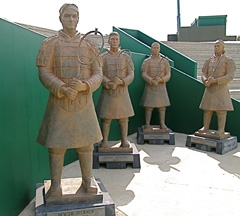
Still, Rafa had to serve it out, the balls hardly visible.
“In the last game, I’m serving, but I wasn’t see nothing. So dark. I thought we have to stop. If I didn’t win the last game we have to stop for sure.”
Roger won the first point, but Rafa startled everybody with his lone serve-and-volley point. Federer retaliated to 15-30 So did Nadal to 40-30, a third match point. It vanished on Roger’s incredible backhand return, his final thrust as king. Where did Rafa serve? Surprisingly to the forehand, a winner, preceding the goodbye forehand from mid-court. As the ball struck the net, nobody, for an instant, believed they were witnessing a coronation.
The clever Manolo Santana, the only other Spaniard to carry the Big W (1966), was spectating, and so was Borg to see if he’d be surpassed. Borg’s winning the Trans-Channel double – French clay, Wimbledon grass – in 1978-79-80 has seemed impossible since. Yet Nadal did it. He crushed Federer at the French, 6-1, 6-3, 6-0, and played the important points better here, dodging 12 of 13 breakers, and making four of 13, to raise his rivalry edge to 12-6.
The Federer era ended with Rafa rolling on the court, then – a first – as a trespasser, climbing into the Royal Box to greet Spanish Crown Prince Felipe and Princess Letizia
Why not? A new king in this town likes to get acquainted. Even losing the French and Wimbledon finals, Roger remains No. 1, Nadal No. 2 on the ATP computer. Silly, isn’t it.
“Roger is the best, he is still No. 1,” is Nadal’s stated opinion. But his crown is gone. Even with a horse he probably couldn’t have saved his kingdom.
Leave a Reply